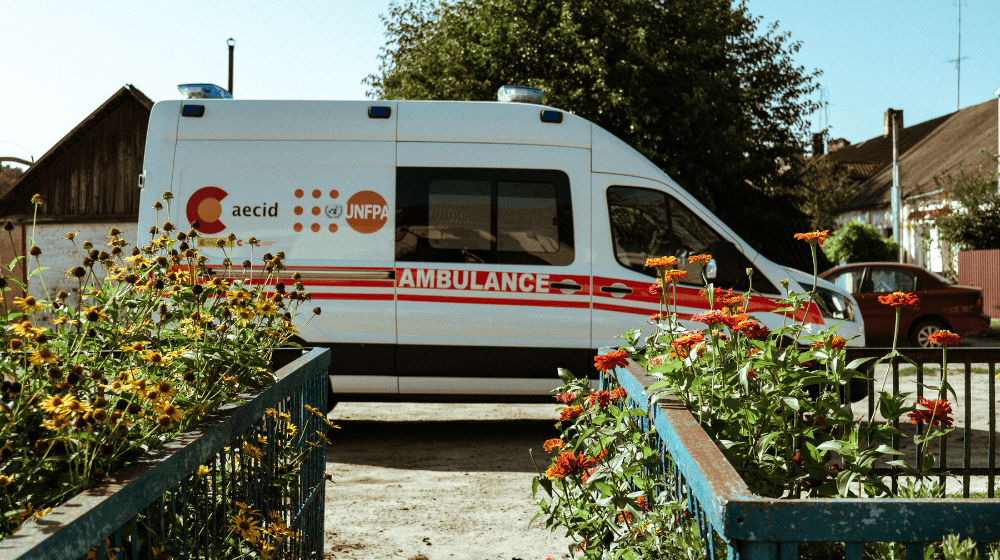Attacks on hospitals, roads and energy infrastructure have caused widespread blackouts and disrupted basic services in Ukraine. In response, UNFPA-supported Mobile Health Units are able to bring lifesaving sexual, reproductive healthcare services to people in most need, including pregnant women.
With 25 teams working in 22 regions throughout Ukraine, Mobile Health Units are staffed with Ukrainian healthcare personnel, attached to existing healthcare units.
To date, the teams have provided over 100,000 consultations. 70% of first-time diagnostics have been made through this mobile service – testament to the utility of this outreach service to areas which lack such diagnostic capability and capacity.
Often working close to the frontline, these healthcare heroes are working in challenging conditions.
Here are some of their stories:
Valentina, a midwife in the SRH Mobile Health Unit in the Sumy region.
"We go to communities to make healthcare accessible to all women. Since the full-scale war began, the problem with reproductive health in the Sumy region has become even more acute due to several factors. Firstly, people from communities find it difficult to travel for check-ups because either the roads are destroyed, there's no transportation available, or they simply don't have the means. In their hometowns, there are usually only pediatricians, therapists, and family doctors. Consequently, a gynecologist is inaccessible for these women," notes Valentina, a member of the brigade.
Vira Myrets, a midwife with the SRH Mobile Health Unit in the Kyiv region.
"It's great that this mobile service exists. All these services are quite expensive now days, due to the war, but thanks to UNFPA, we can provide assistance for free. Many people come to us who find it difficult to reach the nearest gynecological department or doctor. It's a pleasure to help them," noted Vira.
Alexander Petrovich, a doctor in a SRH Mobile Health Unit on duty in the Kyiv region.
"Working in a mobile medical team has a different nature than traditional hospital consultations. However, the algorithm for providing assistance is the same, and you already know the treatment path, the age-related changes that occur, what can be treated at home, when it's time to see a doctor, what concerns people, and so on," says Alexander Petrovich.
Irina, a midwife from the Donetsk SRH Mobile Health Unit.
"If severe cases or indications for hospitalization are identified during the examination, the medical team refers the patient for further examination to other healthcare. At medical institutions funded by the National Health Service of Ukraine, patients also have the right to receive medical services and medications free of charge," Irina highlights.
Victor, a doctor specializing in ultrasound diagnostics in the SRH Mobile Health Unit.
"Outside of the ultrasound diagnostic room, there are no more than four women waiting, because the doctors conduct examinations quickly and efficiently. Patients from villages are very happy about the mobile team's visits, because otherwise they would have to travel to the nearest city with small children, wait in long queues, and maybe not even get to the right doctor. Women discuss when the doctors will come again, so they can bring their relatives and friends," the doctor notes.
Aliona Lagunenko, a medical intern with the SRH Mobile Health Unit in the Kyiv region.
"During my time working with the team, the case that struck me the most was when a woman came for a consultation at the sixth or seventh month of her pregnancy. Because, due to the course of military operations and the remoteness of her place of residence, she couldn't attend the consultation earlier. And had not been registered at the women's consultation center. Specialists referred her to the Kyiv Regional Perinatal Center," shared Dr. Aliona.
You can find out the schedule of the Mobile Health Unit visits to specific regions by calling the hotline for women's health support at 3033. The hotline operates every day from 9:00 AM to 6:00 PM.
Learn more about the hotline's operation or free services in the field of women's health at the following link: https://health-of-women.com/
Additional Information:
Mobile gynecological teams operate as part of humanitarian response initiatives by the United Nations Population Fund, with financial support from the European Union (EU), the Ministry of Foreign Affairs of France, and the Republic of Korea.


